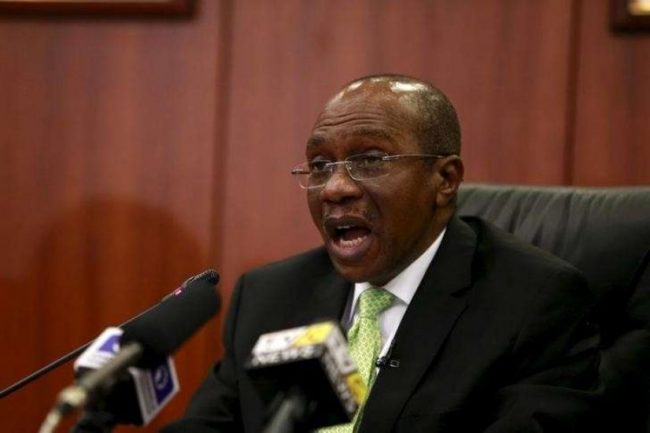

The Monetary Policy Committee (MPC) of the Central Bank of Nigeria (CBN) on Tuesday stated that the outbreak of the coronavirus pandemic would lead to massive economic crisis capable of throwing many countries into recession.
MPC said the COVID-19 pandemic would not only result in health crises, but also massive economic crises that would force even leading industrialised countries into recession.
The CBN Governor, Godwin Emefiele, announced the position of the committee at the end of its two-day meeting held at the apex bank’s headquarters in Abuja.
Emefiele said the MPC underscored the COVID-19 pandemic as a public health crisis which would continue to undermine any monetary or fiscal stimulus unless appropriate measures were taken to trace, test, isolate and treat infected persons in order to curtail the spread.
While calling for a significant reduction in migration across the country, the governor said the committee urged the Federal Government to take the necessary steps to safeguard the population through close monitoring and emergency measures to identify and care for infected persons in the country.
Read Also: Coronavirus: Sanwo-Olu Orders Closure Of All Markets, Stores
He said the overall medium-term outlook for the global economy remained uncertain with increased deterioration in financial market conditions and weak global output growth.
The governor said some of the major headwinds to the current projection for global growth included disruption to the global supply chain arising from the COVID-19 pandemic; oil price downturn as a result of subdued global demand and vulnerabilities in major financial markets.
Others are rising corporate debt in the advanced economies and public debt in some emerging markets and developing economies as well as broad uncertainties leading to adverse shocks to foreign investment flows.
He said, “The committee reviewed the prevailing adverse conditions in the global economy such as the COVID-19 pandemic and the oil price shock as well as the likelihood of continued oil supply glut into the near future, focusing on the impact of these headwinds on the Nigerian economy.
“The committee observed that not only will the COVID-19 pandemic result in health crises, it will also result in massive economic crises that will force many countries into recession, including the leading industrialised countries.”
While taking into cognisance the impact of the decline in oil prices on external reserves, exchange rate pressures, the CBN governor said the MPC commended the CBN for its prompt response with the adjustment of the exchange rate to uniform market rates and the removal of distortions.
On the weakened revenue position of the Federal Government, arising from the sharp drop in oil prices, Emefiele said the MPC reiterated the need for government to urgently reduce reliance on oil revenue by gradually diversifying the economy and improving tax collection.
While noting the speedy response of the Federal Government to the oil price shock by the revision of the 2020 budget downwards by N1.5tn and the oil price benchmark to $30 per barrel, Emefiele said the committee urged the National Assembly to fully cooperate with the Federal Government in coming up with a budget that reflects current economic realities.
On the introduction of price modulation measures, resulting in reduction in the pump price of Premium Motor Spirit from N145 to N125 per litre, he said the move would boost aggregate demand, lower inflation and improve the welfare of the ordinary Nigerians.
The CBN governor said the MPC noted the persistence of inflationary pressures adding that this was attributed to a combination of monetary and structural factors.
It urged the Federal Government to leverage on Public Private Partnership to intensify investment in infrastructure to increase output and employment.
On the need for more investments inflow into the economy, the governor said there were potential for investments inflow into the Nigerian auto manufacturing, aviation and rail industries.
While recognising the success of the CBN’s loan-to-deposit ratio policy and its potential to alleviate production shortfalls, reduce unemployment and boost aggregate demand, the governor said the committee urged the apex bank to pursue this initiative and other related policies to a conclusive end.
He said since May 2019 when the LDR policy was introduced, aggregate credit had risen to N2.35tn.
Given a sectoral distribution of credit between May 2019 and February 2020, he said the manufacturing sector got N533.06bn; general retail and consumer loans, N380.71bn; and general commerce, N229.87bn.
Others are agriculture, forestry and fishing, N163.04bn; information and communications, N163.69bn; finance and insurance, N131.2bn; construction, N112.25bn; and transportation and storage, N45.42bn among others.
On the key monetary policy parameters, the CBN governor said the committee retained the Monetary Policy Rate at 13.5 per cent.
He said all members of the committee agreed to retain the current monetary policy stance.
The apex bank boss said the committee also held the Cash Reserves Ratio at 27.5 per cent while the Liquidity Ratio was left unchanged at 30 per cent.
Emefiele said the committee also left the Asymmetric Window at +200 and -500 basis points around the MPR.
Explaining the rationale for the decision, the governor said the committee took cognisance of the need to address the unfolding unfavourable macroeconomic developments, and inflation.
Others are the need to support growth and employment through its interventions, check capital outflows and support external reserves accretion.
He said, “A review of the policy options indicates relative tightness of the current monetary policy stance.
“The CRR was increased at the last MPC meeting. Time is required for its full effects to manifest. Increasing the MPR will be contradictory to the recent reduction of interest rate in the CBN intervention windows from nine per cent to five per cent.
“Besides, an increase in MPR will be taken by the Deposit Money Banks as an invitation to increase lending rates and this will be most undesirable at this point in time when efforts are being made to avert a recession,” he stated
The apex bank governor also maintained that a reduction in the MPR would not encourage the DMBs to reduce lending rates.





















